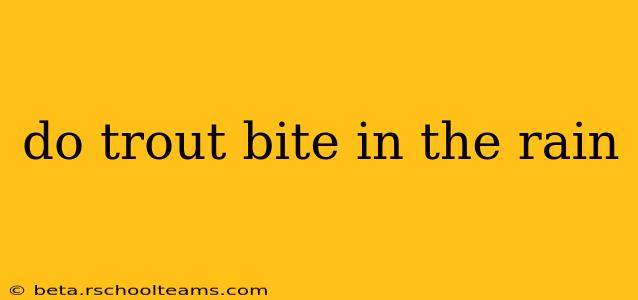The question of whether trout bite in the rain is a common one among anglers. The answer, like many things in fishing, isn't a simple yes or no. Rain's impact on trout feeding behavior is complex and depends on several factors. While some days the rain shuts them down completely, other times, it can actually improve your chances of a catch. This guide will explore the nuances of rainy-day trout fishing, helping you determine if it's worth grabbing your rod when the skies open up.
Does Rain Affect Trout Behavior?
Yes, rain significantly affects trout behavior. The changes aren't always negative; they depend heavily on the intensity and duration of the rainfall, the type of water body, and the overall weather conditions.
How Heavy Rain Affects Trout
Heavy, torrential rain can negatively impact trout fishing. The sudden increase in water volume and turbidity (cloudiness) can make it difficult for trout to feed effectively. The muddy water reduces visibility, making it harder for them to locate prey. Furthermore, the increased water flow can push prey out of their usual feeding areas, making it difficult for trout to find food. In these conditions, they're less likely to actively hunt.
Light to Moderate Rain and Trout
Conversely, light to moderate rain can sometimes enhance your chances of catching trout. The increased water flow often carries a wealth of insects and other food sources into the stream or river. This influx of food can stimulate trout into feeding more aggressively. The rain also muffles sounds, reducing the chances of spooking the fish.
What About Different Types of Water?
The type of water body also influences how trout respond to rain.
Rivers and Streams
In rivers and streams, the effects of rain can be more dramatic. A sudden downpour can drastically alter water levels and clarity. Trout may seek shelter in deeper pools or under overhanging banks during heavy rain. However, a gentle rain can bring increased insect activity, creating a feeding frenzy.
Lakes and Ponds
In lakes and ponds, the effects of rain are generally less pronounced. While heavy rain can decrease visibility, it usually doesn't drastically change water levels as quickly as in rivers. The impact on trout feeding behavior is therefore less dramatic, though increased runoff can still affect water clarity.
What are the Best Lures and Techniques for Rainy Day Trout Fishing?
Choosing the right lures and techniques is crucial for success during rainy weather.
- Visibility Matters: Opt for lures with high visibility, such as bright colors or those with added flash or vibration.
- Scent is Key: Consider lures with strong scents, as trout may rely more on their sense of smell in murky water.
- Slow and Steady: Employ slower, more deliberate retrieves to give trout more time to detect your lure.
- Stay Under Cover: Try fishing from under overhanging trees or bushes to remain out of the direct rain and avoid spooking fish.
What Time of Day is Best for Trout Fishing in the Rain?
While there's no magic time, the best time to fish often correlates with insect activity. Early mornings and evenings are usually good bets, as insect activity often peaks during these periods, regardless of rainfall.
Do trout bite better before or after a rain storm?
Trout often feed actively after a rain storm, once the water has cleared somewhat and insect activity picks up. The preceding rainfall has introduced a plentiful food supply. However, during the storm itself, it can vary greatly depending on the intensity and water conditions.
How does the type of rain affect trout feeding?
Light to moderate rain can be beneficial, increasing food availability. Heavy rain, however, typically makes trout less active due to reduced visibility and disrupted feeding areas.
Summary:
Whether trout bite in the rain depends greatly on several factors, including the intensity and duration of the rain, the type of water body, and the overall weather conditions. While heavy rain can be detrimental, light to moderate rain can actually create excellent fishing opportunities. By understanding these nuances and adapting your techniques accordingly, you can increase your chances of a successful rainy-day fishing trip. Remember to always prioritize safety and check weather forecasts before heading out.
